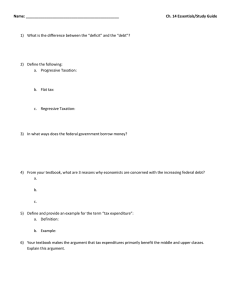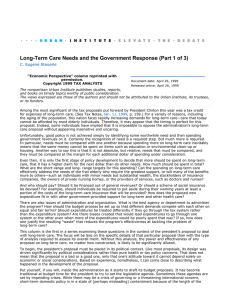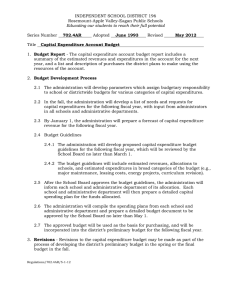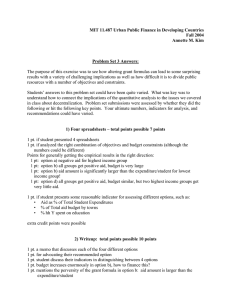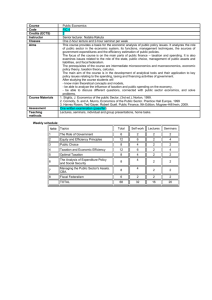Some Future Directions for Public Finance C. Eugene Steuerle
advertisement
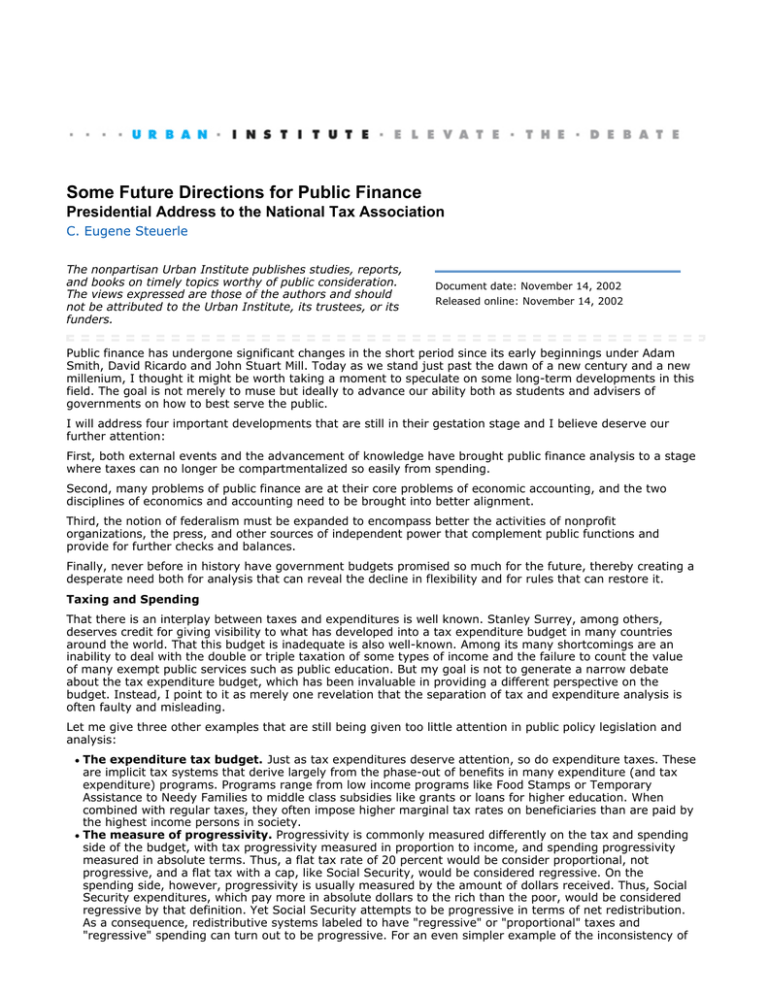
Some Future Directions for Public Finance Presidential Address to the National Tax Association C. Eugene Steuerle The nonpartisan Urban Institute publishes studies, reports, and books on timely topics worthy of public consideration. The views expressed are those of the authors and should not be attributed to the Urban Institute, its trustees, or its funders. Document date: November 14, 2002 Released online: November 14, 2002 Public finance has undergone significant changes in the short period since its early beginnings under Adam Smith, David Ricardo and John Stuart Mill. Today as we stand just past the dawn of a new century and a new millenium, I thought it might be worth taking a moment to speculate on some long-term developments in this field. The goal is not merely to muse but ideally to advance our ability both as students and advisers of governments on how to best serve the public. I will address four important developments that are still in their gestation stage and I believe deserve our further attention: First, both external events and the advancement of knowledge have brought public finance analysis to a stage where taxes can no longer be compartmentalized so easily from spending. Second, many problems of public finance are at their core problems of economic accounting, and the two disciplines of economics and accounting need to be brought into better alignment. Third, the notion of federalism must be expanded to encompass better the activities of nonprofit organizations, the press, and other sources of independent power that complement public functions and provide for further checks and balances. Finally, never before in history have government budgets promised so much for the future, thereby creating a desperate need both for analysis that can reveal the decline in flexibility and for rules that can restore it. Taxing and Spending That there is an interplay between taxes and expenditures is well known. Stanley Surrey, among others, deserves credit for giving visibility to what has developed into a tax expenditure budget in many countries around the world. That this budget is inadequate is also well-known. Among its many shortcomings are an inability to deal with the double or triple taxation of some types of income and the failure to count the value of many exempt public services such as public education. But my goal is not to generate a narrow debate about the tax expenditure budget, which has been invaluable in providing a different perspective on the budget. Instead, I point to it as merely one revelation that the separation of tax and expenditure analysis is often faulty and misleading. Let me give three other examples that are still being given too little attention in public policy legislation and analysis: The expenditure tax budget. Just as tax expenditures deserve attention, so do expenditure taxes. These are implicit tax systems that derive largely from the phase-out of benefits in many expenditure (and tax expenditure) programs. Programs range from low income programs like Food Stamps or Temporary Assistance to Needy Families to middle class subsidies like grants or loans for higher education. When combined with regular taxes, they often impose higher marginal tax rates on beneficiaries than are paid by the highest income persons in society. The measure of progressivity. Progressivity is commonly measured differently on the tax and spending side of the budget, with tax progressivity measured in proportion to income, and spending progressivity measured in absolute terms. Thus, a flat tax rate of 20 percent would be consider proportional, not progressive, and a flat tax with a cap, like Social Security, would be considered regressive. On the spending side, however, progressivity is usually measured by the amount of dollars received. Thus, Social Security expenditures, which pay more in absolute dollars to the rich than the poor, would be considered regressive by that definition. Yet Social Security attempts to be progressive in terms of net redistribution. As a consequence, redistributive systems labeled to have "regressive" or "proportional" taxes and "regressive" spending can turn out to be progressive. For an even simpler example of the inconsistency of definitions, consider the redistributive impact a flat rate tax and an expenditure system that provides roughly the same amount to all citizens. Neither by themselves are labeled progressive, yet their net impact is progressive or —. Textbook analysis. On the tax side of most public finance textbooks, attention is usually given to the classic tax principles such as horizontal equity or equal justice, progressivity, efficiency, and simplicity. On the spending side analysis quickly turns to cost-benefit and other technical tools of analysis. In theory and in fact, taxes are like negative expenditures, expenditures like negative taxes, and the methods of analysis almost always apply equally on both sides of the budget. As an example, farm subsidies supposedly serve allocative functions. But seldom if ever does one see a distributional table, as is done for most tax bills, on farm subsidies. On the other hand, cost-benefit analysis that might be applied to most discretionary spending items should just as easily be applied to research credits and charitable deductions. But the issue isn't only analysis, it's also the way in which policy is developed and considered. In many countries, various tax credits (such as earned income credits and child credits) are not well-integrated with spending programs. Similarly, a large portion of the health care debate centers on whether tax credits or expenditure vouchers can serve as mechanisms for constraining costs in lieu of direct government control of prices and quantities. But those considerations often must be forced into the process through the side door. Public Economics and Accounting So many of the problems addressed in government finance and public economics are in whole or in part problems of economic accounting. Consider tax issues ranging from the appropriate treatment of capital gains to the equal taxation of households with equal means and needs to differences between statutory and effective rates of taxation. When the tax reform proposal of Treasury was developed in 1984, much of the exercise was centered largely on finding those exceptions to a uniform tax on economic income (including the double taxation of some types of income). The shelter industry — and each era seems always to grow its own crop — is derived in no small part from the ways that accounting systems (and related reporting systems) have evolved. A number of scholars have suggested that many problems of taxation could be solved if we could figure out ways to better integrate financial and tax accounting for income — perhaps with movement in both systems of account toward greater conformity with economic income. In the 1986 tax reform effort, many of the taxable income items considered for reform were those that did not comport well with a measure of economic income. Of course, one can argue that at times the provisions went too far, at least in terms of what could be administered. But that criticism is still largely an issue of accounting. Or we can go beyond tax issues. Think of the recent debates over corporate accounting, executive pay, and stock options in the U.S. Beyond the U.S., how about bank bad debt in Japan or the true subsidy value of IMF loans? Again, all of these are at their core accounting issues. Unfortunately, most economists are not really trained well in accounting, and most accountants are thrown quickly into the calculation of credits and debits under some fixed set of rules without really being well trained in the relationship between the accounts they use and the underlying economic income or other factor that presumably they are trying to measure. It seems to me, therefore, that there is a large opportunity for universities and colleges to develop coursework on economic accounting that could be quite valuable to both economics and accounting professions, including those who come to work in fields of public finance, public economics, or taxation. A More Encompassing Sense of Federalism The most genocidal century in the history of humankind has been followed at its beginning by an outpouring of religious and tribal slaughter of innocents. Today we sit in the midst of this period, not knowing entirely how history will judge our ability to have avoided these events or the adequacy of current counter-measures. But I believe that among our recorded failures will be an inadequate attention to a strengthened system of federalism that can deter violence, anarchy, and corruption. Although federalism has a long history, it often has been defined too narrowly. In the modern period, we are coming increasingly to recognize the vital role of non-governmental institutions — principally charities and the press — in serving as alternative sources of power and influence, checks and balances, in a society. Looking back on a half century or more of foreign aid, for instance, what becomes apparent is that much of that aid simply inured to the benefit of government officials, often people in with dictatorial or at least monopoly power. Rather than a case against aid, this history provides an even stronger case for aid that would strengthen many alternative institutions, whether regional or local government, nonprofit organizations or the free press. In that way, societies attempting to develop both economically and politically can make use of sets of competing institutions — institutions strong enough to achieve economies of scale in advancing society, but not so strong that they could easily ride herd over the rights of individuals. Many officials from around the world come to the U.S. for advice, but so often one finds them locked in systems where there is a) no local taxing authority, hence local dependence upon some national or monopolistic source of revenues, b) no free press at the local level, thus inviting corruption, and c) few nonprofit institutions, thus encouraging abuse of power and a weak social welfare sector, often with additional inefficiency deriving from an insulted bureaucracy. Top down solutions, no matter how well intentioned or how benevolent the despots, inevitably fail — in no small part because people do not gain a sense of control over their own destinies. Government finance more and more must start to gain a renewed sense of competing institutions and of an encompassing sense of federalism. Some fledgling efforts have already begun. Examples include the greater insistence of IMF officials on "non-corruptibility" as one of the distinguishing principles or characteristics of a good tax system, and the World Bank efforts to strengthen regional and local government. But we have much, much further to go, especially in developing local government, charitable, and press institutions with own sources of funding that make them viable on their own. In the case of local government, of course, this requires separate taxing authority and not complete dependence upon revenue sharing from higher levels. Charitable and press institutions need their own private sources of funds and cannot be dependent mainly upon government, although some might receive some operating income for acting as a service provider. Promising Away the Future Governments at all levels — national, regional, state, and local — in almost all developed and some less developed countries have increasingly adopted budgetary policies that limit choices, reduce flexibility, lead to government institutions out of touch with the needs of society, and take power away from current voters, thus reducing democratic support. The main culprits in creating reduced flexibility are programs built with eternal rates of growth that bypass a regular appropriations process. Generally speaking, the largest of such programs are related to retirement and health. But policy makers have increasingly come to realize how this game is played on the tax side of the budget also. Many tax subsidies are permanent and also contain significant built-in growth. In 2001 the United States enacted tax legislation with a ten-year phase in period — a record by any stretch of the imagination. What these built-in growth rates essentially do is decide for today the needs of tomorrow. As a consequence, they take away from future voters most choices as to how to spend revenues that will be available at that time. It is as if tomorrow's voters are to be treated forever as adolescents for whom their forbears must make all or most decisions. Today's laws state that we do not trust them to make decisions based on the knowledge of their own day and the demands of their own time. Restoring flexibility and slack to the budget is required simply because we cannot anticipate well the needs of tomorrow. Moreover, while it is possible to renege on promises through new legislation, it is difficult not only because it is distasteful but because it generally takes a type of supermajority — in the U.S., concurrence of both houses of Congress and the President are required. Discretionary programs — which must obtain the same type of supermajority simply to maintain their current levels of expenditures — are forever at a disadvantage in the budget process. It is not a level playing field. Finally, lack of flexibility locks in sources of clear discrimination and inequity. One example is in Social Security itself, which has substantial automatic growth. This system provides many additional benefits at no additional tax cost to spouses and survivors but not to single heads of household. These single heads of household may pay more tax, raise more children, and work harder, yet in the end receive fewer benefits because of this discrimination. The automatic growth in the system adds to this discrimination in absolute terms and reduces the flexibility to reform it. Summary If we could move public finance forward to deal with the four developments noted here, I believe both the field and the public would be well-served. By considering taxes and spending together, governments would avoid many sources of inefficiency, duplication, and piling up of disincentives. Better training in economic accounting would add to the intellectual caliber of both economics and accounting as professions. Democracy would be strengthened in many countries if federal systems gave more attention to the importance of competing institutions, left some taxing authority with local government, and helped develop nonprofits and press institutions with stable private sources of funds. Finally, renewed attention to issues of slack and flexibility will over the long run strengthen the ability of government to respond to the most pressing of societal needs. Other Publications by the Authors C. Eugene Steuerle Usage and reprints: Most publications may be downloaded free of charge from the web site and may be used and copies made for research, academic, policy or other non-commercial purposes. Proper attribution is required. Posting UI research papers on other websites is permitted subject to prior approval from the Urban Institute—contact publicaffairs@urban.org. If you are unable to access or print the PDF document please contact us or call the Publications Office at (202) 261-5687. Disclaimer: The nonpartisan Urban Institute publishes studies, reports, and books on timely topics worthy of public consideration. The views expressed are those of the authors and should not be attributed to the Urban Institute, its trustees, or its funders. Copyright of the written materials contained within the Urban Institute website is owned or controlled by the Urban Institute. Source: The Urban Institute, © 2012 | http://www.urban.org
